Demolition Contractors Willows
Find Demolition Contractors Near Me in Willows
Receive multiple Demolition Companies quotes for your project today! Compare profiles, reviews, accreditations, portfolio, etc... and choose the best deal.
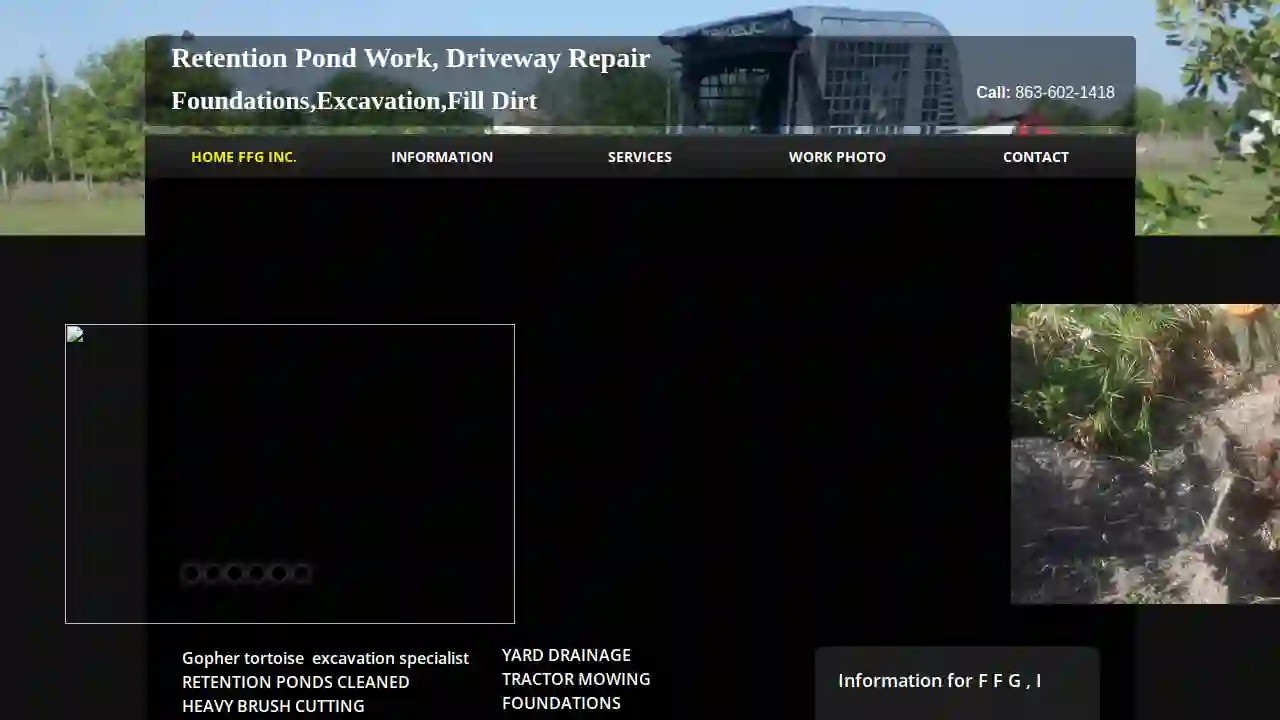
Florida Finish Graders, Inc.
52 reviewsDavis, USFlorida Finish Graders, Inc. Florida Finish Graders, Inc. is located in Central Florida, with Service provided coast to coast. We are your source for central Florida land clearing, grading, excavation, foundations, and bobcat work, tractor work. We here at Florida Finish Graders, Inc. do the best work the first time, and at the most affordable price! Our Mission Helping property manager's take care of their grounds! We provide a variety of services for you. We can put together a plan so that your work site is in compliance with the FDEP from the start, avoiding costly infractions, as Raymond is a Licensed, State Certified Florida storm water erosion and sedimentation Control Inspector. Our Experience Working with the state of Florida, Operating the backhoe according to direction provided by the Project’s Florida Fish and Wildlife Conservation Commission (FWC) Gopher Tortoise Authorized Agent to excavate gopher tortoise. We tear out concrete driveways for complete replacement. Florida driveways can be made with recycled material, such as crushed concrete and asphalt-black top. Tree stump removal, tree stump grinder, large or small, we do it all. F F G Inc., has done many retention ponds or detention pond, new and rebuild to swfwmd standards for recertification, they have certified our work for double the standard time because of the superb work on our retention pond, swale work, grading, sod etc.. Florida Finish Graders, Inc. has sand and fill dirt for your yard, or complete tear out of your grass yard, (sod) and then re-grade your yard, then apply grass. FFG Inc,. can build your home foundation from the ground up or fill in stem wall foundation, building mono slab foundations. We provide sand, fill dirt, recycled material in central Florida. We can level your dirt.
- Services
- Why Us?
- Gallery
Get Quote
Summit Building Group
51 reviewsSacramento, USSummit Building Group: Your Vision, Our Expertise At Summit Building Group, we are passionate about transforming your vision into reality. We are a full-service construction company specializing in a wide range of projects, from residential remodeling and additions to commercial building construction and tenant improvements. Our commitment to quality craftsmanship, meticulous attention to detail, and collaborative approach ensures a seamless and rewarding construction experience. We understand that building or renovating your space is a significant investment, and we are dedicated to providing you with the highest level of service and expertise. Our team of experienced professionals, including architects, designers, project managers, and skilled craftsmen, work together to deliver exceptional results that exceed your expectations. Whether you are dreaming of a stunning kitchen remodel, a spacious home addition, or a modern commercial building, Summit Building Group is your trusted partner. We are committed to building lasting relationships with our clients, providing transparent communication, and delivering projects on time and within budget. Contact us today to schedule a free consultation and let us help you bring your vision to life.
- Services
- Why Us?
- Gallery
Get Quote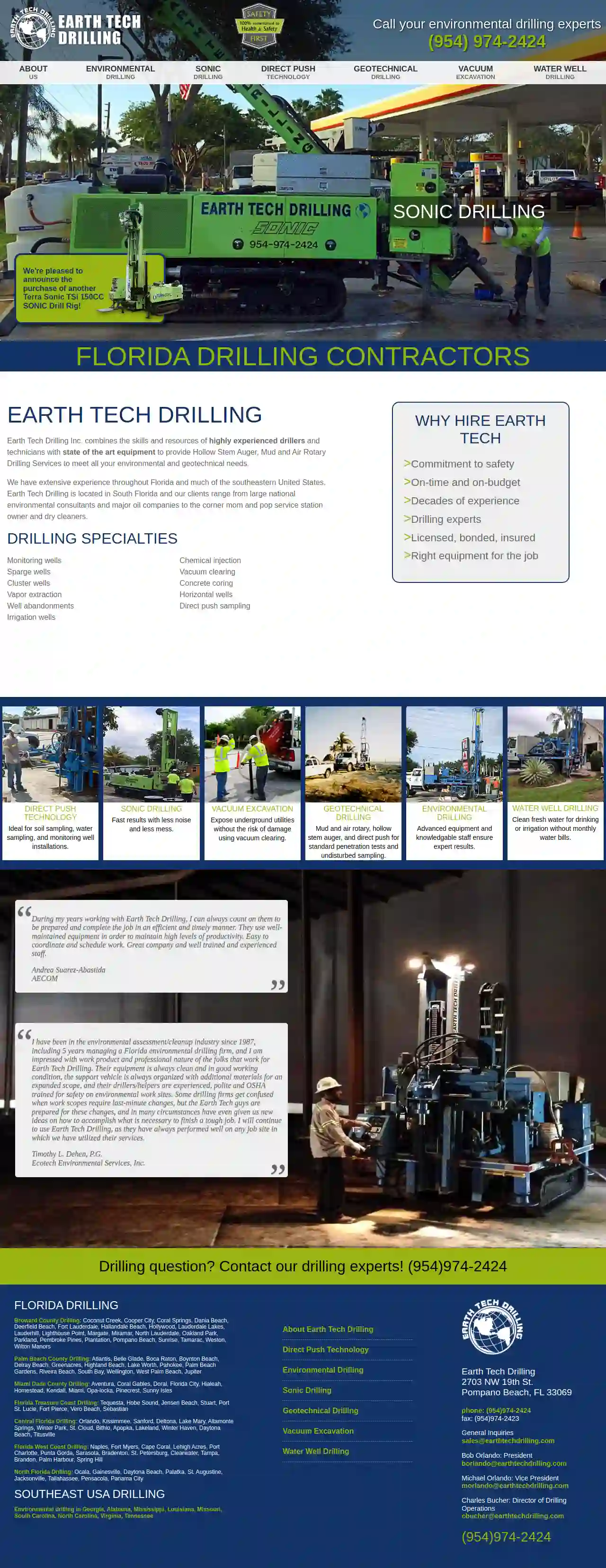
Earth Tech Drilling
4.610 reviews2703 NW 19th St., Pompano Beach, 33069, USEarth Tech Drilling Earth Tech Drilling Inc. combines the skills and resources of highly experienced drillers and technicians with state of the art equipment to provide Hollow Stem Auger, Mud and Air Rotary Drilling Services to meet all your environmental and geotechnical needs. Experience We have extensive experience throughout Florida and much of the southeastern United States. Earth Tech Drilling is located in South Florida and our clients range from large national environmental consultants and major oil companies to the corner mom and pop service station owner and dry cleaners. Why Hire Earth Tech Commitment to safety On-time and on-budget Decades of experience Drilling experts Licensed, bonded, insured Right equipment for the job
- Services
- Why Us?
- Our Team
- Testimonials
- Gallery
Get Quote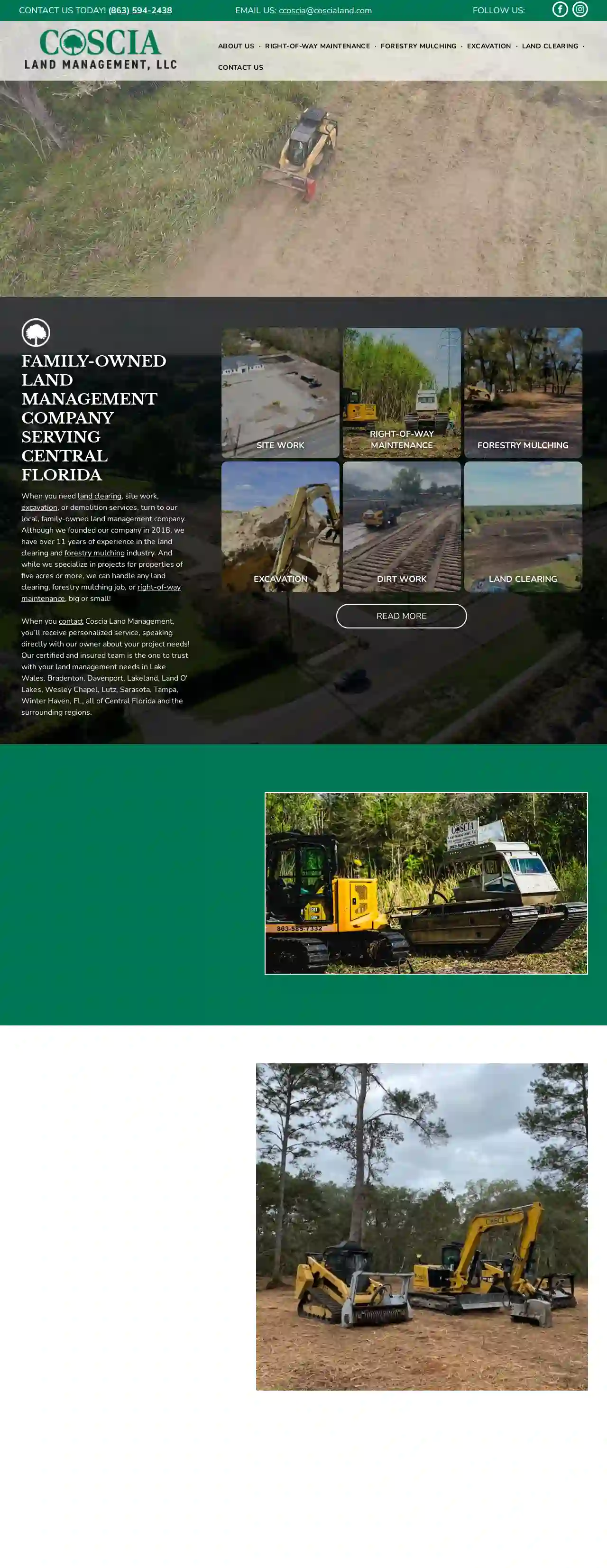
Coscia Land Management
526 reviewsLake Wales, FL, USAbout Coscia Land Management Coscia Land Management is a family-owned and operated business serving Central Florida since 2018. We have over 11 years of experience in the land clearing and forestry mulching industry, and we specialize in projects for properties of five acres or more. We also handle smaller jobs, such as right-of-way maintenance. Our team is certified and insured, and we pride ourselves on providing the highest quality workmanship and exceptional customer service. We are committed to preserving the land in Central Florida and the surrounding regions. We use state-of-the-art equipment and techniques to minimize our impact on the environment. We also work to protect the ecosystem on the site and in the surrounding areas. We are proud to work with property owners throughout Lake Wales, Bradenton, Davenport, Lakeland, Land O' Lakes, Wesley Chapel, Lutz, Sarasota, Tampa, Winter Haven, FL, and all of Central Florida and the surrounding regions.
- Services
- Why Us?
- Gallery
Get Quote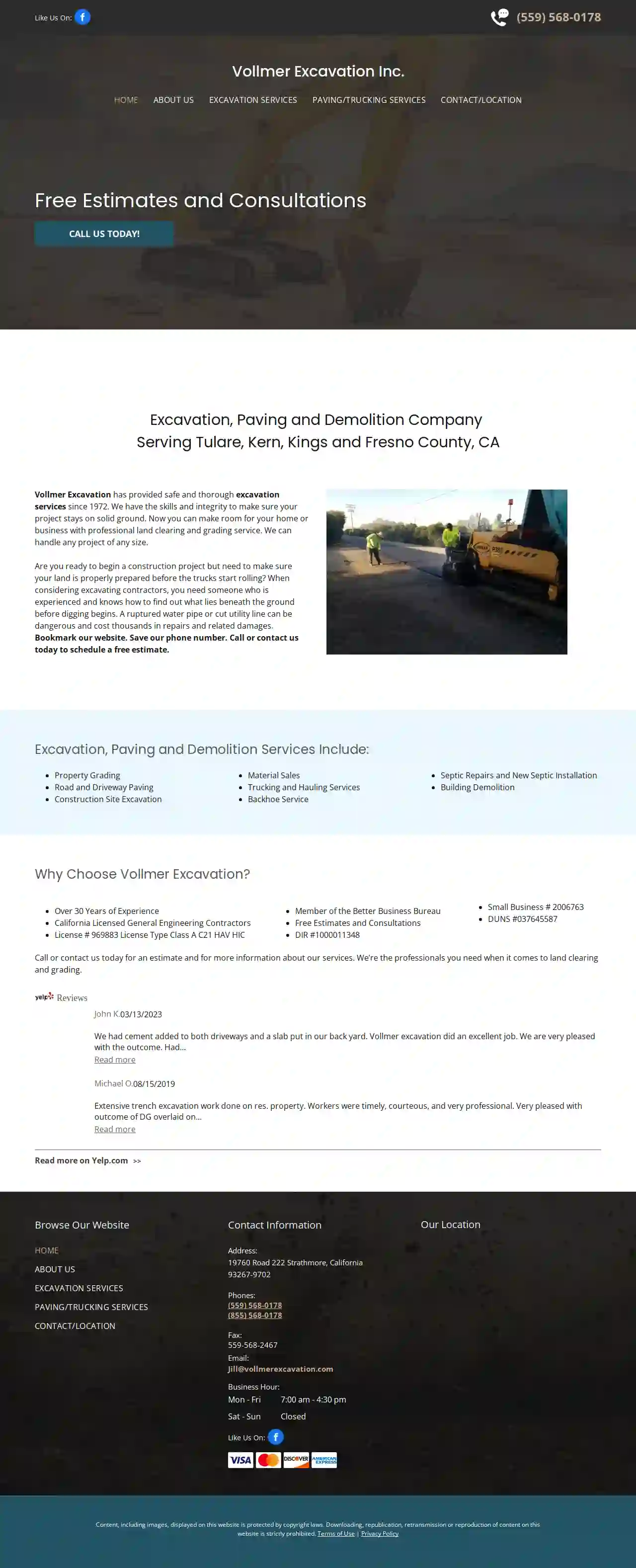
Vollmer Excavation
511 reviews19760 Road 222, Strathmore, 93267-9702, USAbout Vollmer Excavation Since 1972, Robert Vollmer started his one-man business in Tulare County. He began with a backhoe service, providing services for farming operations, construction jobs, and septic system repairs. After several years, he expanded his services to include swimming pool excavation, dump truck service, and material sales. Over the years, the business has grown and expanded its services throughout the Central Valley. Vollmer Excavation believes no job is too small. Contact our office for a free estimate. We provide all types of earthwork, road construction, residential and commercial projects, asphalt paving, demolition, septic tank repairs and installation, backhoe and trucking services, and material sales. Contact us with any questions regarding the type of work we do, and we will be more than happy to provide you with an estimate for service. Why Choose Vollmer Excavation? Over 30 Years of Experience California Licensed General Engineering Contractors License # 969883 License Type Class A C21 HAV HIC Member of the Better Business Bureau Free Estimates and Consultations History of Vollmer Excavation: Bob was born and raised in the Lindsay, California area. His family lived in the foothills of Lindsay where they worked together. Bob and his siblings would go to school and after they returned home they worked with their parents, packing fruit, caring for the family ranch, and working in the family granite pit. In the 1970’s, Bob worked at the local creamery doing maintenance on their equipment. An acquaintance of his stopped by to let him know that he had a backhoe for sale and wanted to know if Bob knew of anyone who may be interested. The backhoe was really worn out, but Bob thought he could repair it and sell it for a small profit. Friends and neighbors started asking him to do some work for them before he sold his backhoe. Of course, he wasn’t going to say no, one small job led to another and before he knew it he had his own backhoe business. Bob ran the old Ford Major backhoe for about a year and a half until the boom broke in half. He upgraded to a newer machine and landed a nice contract with a swimming pool company digging pools. When a different swimming pool contractor-asked for his services it was time to start hiring help. This small one-man business has grown to 25 employees today, one employee recently retired being one of the original employees starting in 1972 and worked with him until 2013, a total of 41 years! Bob’s employees are more than just employees to him, they are friends, family. To this day Bob still has some of his original customers. It is very important to him to take care of his customers and to make sure they are happy. He has made many emergency, middle of the night runs for his customers, anything from pulling a truck out of the mud to repairing a broken pipeline. We can honestly say his work is his life, he loves to work and to help people. Bob has made a great name for himself in the Central Valley and for very good reason!
- Services
- Why Us?
- Gallery
Get Quote
ZS Construction
58 reviewsWoodland, USZS Construction: Your Northern California Construction Partner Established in 2022, ZS Construction is a privately held business serving all of Northern California. We are dedicated to providing high-quality construction services with a focus on customer satisfaction. Our team is committed to delivering exceptional results for every project, no matter the size. ZS Construction, founded by Zach Sanders, is a professional construction company based in Woodland, CA. We offer a wide range of services including excavation, land grading, landscaping, concrete, septic tanks, and demolition. Our expertise and attention to detail ensure that your construction needs are met with the utmost professionalism. We serve Yolo, Tehama, Shasta, Butte, San Joaquin, Napa, Sonoma, and Colusa County. If you are within reach of any of these counties, feel free to get in touch with us today! We provide expert-level service and a timely schedule so you can stay on track for your projects and get things done. Our customers are of the utmost importance to us, and we always strive to meet your expectations and ensure your satisfaction with the level of quality we provide. At ZS Construction, we value our customers above all else. Your needs and project requirements are at the forefront of our business. With our expertise and attention to detail, we guarantee that you will see a noticeable difference in the quality of our work. Being based in Woodland, CA, we service primarily counties in Northern California. Let us handle your construction needs and experience the exceptional service that sets us apart from the rest.
- Services
- Why Us?
- Our Team
- Gallery
Get Quote
Davis Excavating
521 reviews19800 Hirsch Ct #1, Anderson, 96007, USWe Dig It! Your Full Service Excavation Contractor Davis Excavating provides professional commercial and residential excavation services, including dirt work, underground site work, septic systems, and more. Proudly serving Redding, Shasta County, and surrounding areas.
- Services
- Why Us?
- Gallery
Get Quote
B&B Excavation & Drilling
51 reviewsOakland, USExperience Excellence in Excavation: B&B Excavation & Drilling in the San Francisco Bay Area & North Bay Are you searching for qualified drilling and excavation services in the San Francisco Bay Area & North Bay? Be sure to contact B&B Excavation & Drilling. As a reputable family-owned business, we focus on hillside drilling and excavation projects and can meet both big- and small-scale demands. We are prepared to manage a variety of obstacles thanks to our wide range of services, which include: Foundation Drilling Mass & Minor Excavation Landslide repair Soil remediation Structural fire debris removal (Hazwoper certified) Rock hammering Shoring Hard demolition Trucking services (import-export) Trenching Let us be your go-to specialists for all your drilling and excavation needs.
- Services
- Why Us?
- Gallery
Get Quote
EARTH & OAK ENGINEERING
51 reviewsWestlake Village, USExpert Engineering & Construction Services in Westlake Village, CA Open Monday - Saturday, 8:00 AM - 5:00 PM At Earth and Oak Engineering, our mission is rooted in a commitment to excellence and a deep respect for our craft. With over three decades of experience since our establishment in 1990, we stand as seasoned experts in excavation, compaction, grading, and demolition services. Our dedication to quality craftsmanship and customer satisfaction sets us apart in the industry. We believe in leveraging our extensive experience to deliver unparalleled results, ensuring that every project we undertake is executed with precision and expertise. At the core of our mission is a passion for construction, irrigation, and water reticulation. Through years of honing our skills, we have cultivated a reputation for reliability and proficiency. Our goal is to exceed client expectations, providing innovative solutions tailored to meet their unique needs.
- Services
- Why Us?
- Gallery
Get Quote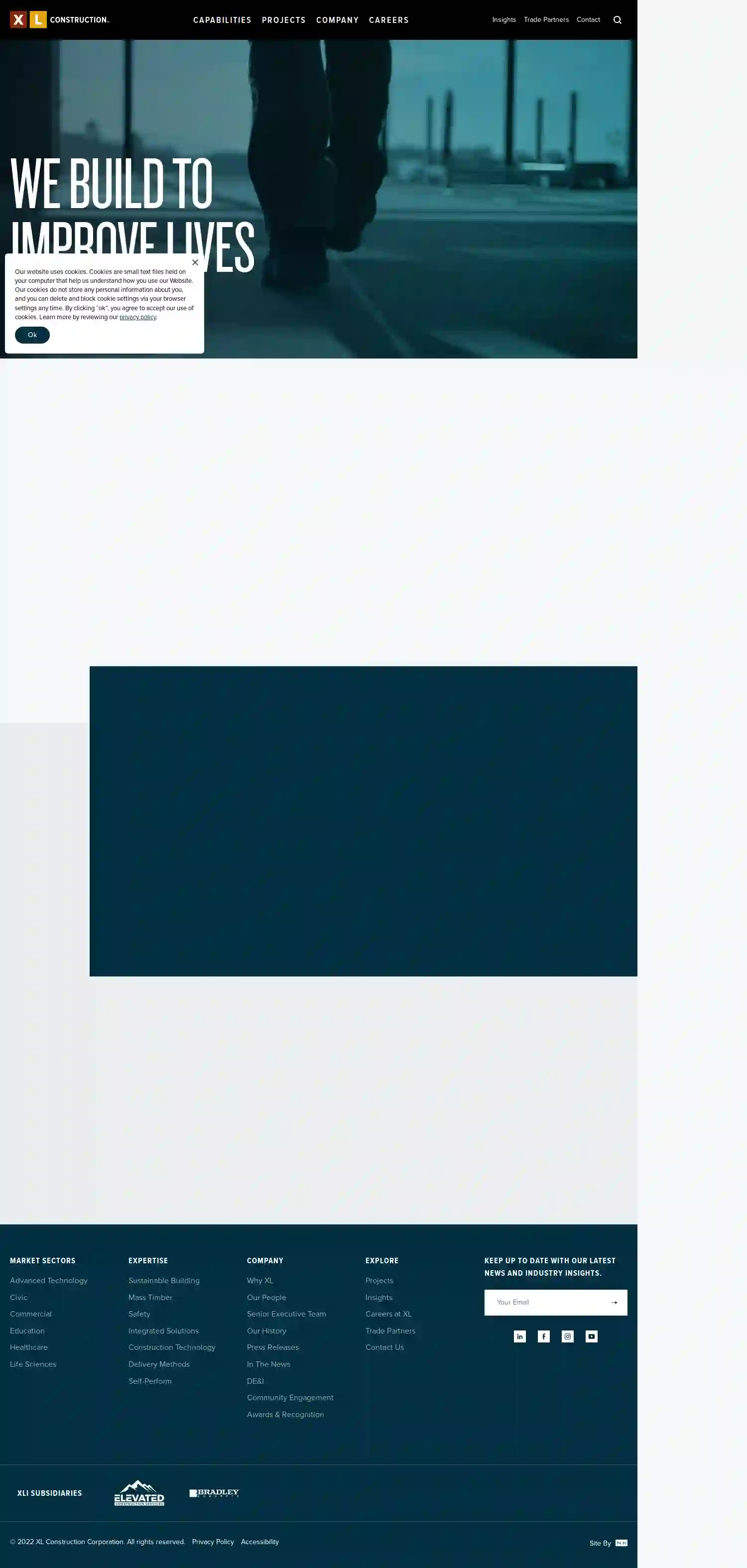
XL Construction
4.630 reviewsCarmichael, USWe Build To Improve Lives Explore XL Construction We Are XL An Enduring Company Our vision is to be an “enduring company”: a company that thrives for decades to come, creates opportunities for those within it, stays competitive in the marketplace, and — most importantly — maintains a strong culture. Watch Video Watch Video Watch Video Our Focus Explore Our Market Sectors Advanced Technology Civic Commercial Education Healthcare Life Sciences Join Our Team Careers at XL Construction Join us in our quest to build to improve lives. Explore Careers Explore Careers Explore Careers
- Services
- Why Us?
- Gallery
Get Quote
Over 22,076+ Excavation Contractors in our network
Our excavation contractors operate in Willows & surroundings!
ExcavationHQ has curated and vetted Top Excavation Businesses near Willows. Find a reliable business today.
Frequently Asked Questions About Demolition Contractors
- Size and Complexity of the Structure: Larger and more complex structures, such as multi-story buildings, require more time, labor, and specialized equipment, increasing costs.
- Type of Demolition: Different demolition methods, such as implosion, wrecking ball, or high-reach demolition, have varying costs.
- Material Disposal: Disposal fees for demolition debris can contribute significantly to the overall cost, depending on the type and quantity of materials.
- Location and Accessibility: Demolition in densely populated areas or with limited access may require more planning and specialized equipment, affecting costs.
- Hazardous Materials: The presence of asbestos, lead paint, or other hazardous materials requires specialized removal and disposal procedures, adding to the expenses.
Can I do demolition myself?
How long does a demolition project take?
How much does demolition cost in the USA?
What is a demolition bond?
Can I do demolition myself?
How long does a demolition project take?
How much does demolition cost in the USA?
- Size and Complexity of the Structure: Larger and more complex structures, such as multi-story buildings, require more time, labor, and specialized equipment, increasing costs.
- Type of Demolition: Different demolition methods, such as implosion, wrecking ball, or high-reach demolition, have varying costs.
- Material Disposal: Disposal fees for demolition debris can contribute significantly to the overall cost, depending on the type and quantity of materials.
- Location and Accessibility: Demolition in densely populated areas or with limited access may require more planning and specialized equipment, affecting costs.
- Hazardous Materials: The presence of asbestos, lead paint, or other hazardous materials requires specialized removal and disposal procedures, adding to the expenses.